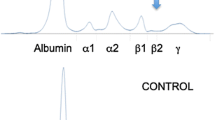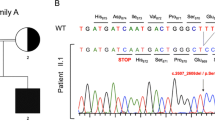Abstract
Purpose
Complement regulators control the activated complement system. Defects in this homeostasis can result in tissue damage and autoimmune diseases with a heterogeneity in clinical presentation. Complement factor I (FI), a serine protease, is an important regulator of alternative pathway activation. We report a diagnostic work-up of a patient with relapsing inflammatory mediated meningo-encephalitis. Our work-up revealed a rare genetic factor I (FI) deficiency. So far, all cases of reported complete factor I deficiency have absent serum levels of FI. We present here a unique case of a complete factor I deficiency based on a functional FI defect.
Methods
Complement assays and measurement of FI activity were performed in the patient, her family, factor H-deficient patients, a patient with C3-nephritic factor and 11 healthy controls. Genetic sequencing of the FI coding regions in the patient and her parents was performed.
Results
The patient had absent alternative pathway activity with low levels of C3 and normal serum level of FI. The patient’s plasma FI did not degrade C3b, with normalisation of C3b degradation after adding purified FI. Mutation analysis of the complement factor I gene revealed two heterozygous mutations (I322T and D506V).
Conclusion
To our knowledge, this paper describes a complete FI deficiency caused by a defect of FI activity for the first time. Normal FI concentration does not exclude a complete FI defect, additional functional analysis of FI is required in any patient with a defect of complement activation. Recurrent aseptic meningo-encephalitis is a rare clinical presentation of complete FI deficiency.




Similar content being viewed by others
Abbreviations
- AP50:
-
Alternative pathway activity
- aHUS:
-
Atypical haemolytic uremic syndrome
- CSF:
-
Cerebrospinal fluid
- CH50:
-
Classical pathway activity
- C1:
-
Complement factor 1
- C3:
-
Complement factor 3
- C4BP:
-
Complement factor 4 binding protein
- CR1:
-
Complement receptor 1
- FB:
-
Complement factor B
- FBb:
-
Complement factor Bb
- FD:
-
Complement factor D
- FDG-PET scan:
-
FluoroDeoxyGlucose-Position Emission Tomography
- FI:
-
Complement factor I
- FIMAC:
-
Factor I membrane attack complex
- FH:
-
Complement factor H
- iC3b:
-
Inactivated C3b
- LDLr-1 and 2:
-
Low-density lipoprotein receptor 1 and 2 domains
- MAC:
-
Membrane attack complex
- MBL:
-
Mannose binding lectin
- MCP:
-
Membrane cofactor protein
- MRI:
-
Magnetic Resonance Imaging
- PCR:
-
Polymerase chain reaction
- PE:
-
plasma exchange
- SP:
-
Serine protease domain
- sSRBC:
-
Sensitized sheep red blood cells
References
Vyse TJ, Spath PJ, Davies KA, Morley BJ, Philippe P, Athanassiou P, et al. Hereditary complement factor I deficiency. QJM. 1994;87(7):385–401. PubMed PMID: 7922290. Epub 1994/07/01. eng.
Nilsson SC, Sim RB, Lea SM, Fremeaux-Bacchi V, Blom AM. Complement factor I in health and disease. Mol Immunol. 2011;48(14):1611–20. PubMed PMID: 21529951. Epub 2011/05/03.
Broderick L, Gandhi C, Mueller JL, Putnam CD, Shayan K, Giclas PC, et al. Mutations of complement factor I and potential mechanisms of neuroinflammation in acute hemorrhagic leukoencephalitis. J Clin Immunol. 2013;33(1):162–71. PubMed PMID: 22926405. Pubmed Central PMCID: 3540165.
Gonzalez-Rubio C, Ferreira-Cerdan A, Ponce IM, Arpa J, Fontan G, Lopez-Trascasa M. Complement factor I deficiency associated with recurrent meningitis coinciding with menstruation. Arch Neurol. 2001;58(11):1923–8. PubMed PMID: 11709004. Epub 2001/11/16. eng.
Bonnin AJ, Zeitz HJ, Gewurz A. Complement factor I deficiency with recurrent aseptic meningitis. Arch Intern Med. 1993;153(11):1380–3. PubMed PMID: 8507128. Epub 1993/06/14. eng.
Bienaime F, Dragon-Durey MA, Regnier CH, Nilsson SC, Kwan WH, Blouin J, et al. Mutations in components of complement influence the outcome of Factor I-associated atypical hemolytic uremic syndrome. Kidney Int. 2010;77(4):339–49. PubMed PMID: 20016463. Epub 2009/12/18. eng.
Zipfel PF, Skerka C. Complement regulators and inhibitory proteins. Nat Rev Immunol. 2009;9(10):729–40. PubMed PMID: 19730437.
de Cordoba SR, Tortajada A, Harris CL, Morgan BP. Complement dysregulation and disease: From genes and proteins to diagnostics and drugs. Immunobiology. 2012;217(11):1034–46. PubMed PMID: 22964229.
Walport MJ. Complement. First of two parts. N Engl J Med. 2001;344(14):1058–66. PubMed PMID: 11287977.
DiScipio RG. Ultrastructures and interactions of complement factors H and I. J Immunol. 1992;149(8):2592–9. PubMed PMID: 1401896. Epub 1992/10/15.
Vyse TJ, Bates GP, Walport MJ, Morley BJ. The organization of the human complement factor I gene (IF): A member of the serine protease gene family. Genomics. 1994;24(1):90–8. PubMed PMID: 7896293. Epub 1994/11/01. eng.
Baracho GV, Nudelman V, Isaac L. Molecular characterization of homozygous hereditary factor I deficiency. Clin Exp Immunol. 2003;131(2):280–6. PubMed PMID: 12562389. Pubmed Central PMCID: 1808620. Epub 2003/02/04. eng.
Nilsson SC, Trouw LA, Renault N, Miteva MA, Genel F, Zelazko M, et al. Genetic, molecular and functional analyses of complement factor I deficiency. Eur J Immunol. 2009;39(1):310–23. PubMed PMID: 19065647. Epub 2008/12/10. eng.
Nita IM, Genel F, Nilsson SC, Smart J, Truedsson L, Choo S, et al. Molecular characterization of two novel cases of complete complement inhibitor Factor I deficiency. Mol Immunol. 2011;48(8):1068–72. PubMed PMID: 21316765.
Saunders RE, Abarrategui-Garrido C, Fremeaux-Bacchi V, de JE G, Goodship TH, Lopez Trascasa M, et al. The interactive Factor H-atypical hemolytic uremic syndrome mutation database and website: Update and integration of membrane cofactor protein and Factor I mutations with structural models. Hum Mutat. 2007;28(3):222–34. PubMed PMID: 17089378. Epub 2006/11/08. eng.
Roversi P, Johnson S, Caesar JJ, McLean F, Leath KJ, Tsiftsoglou SA, et al. Structural basis for complement factor I control and its disease-associated sequence polymorphisms. Proc Natl Acad Sci U S A. 2011;108(31):12839–44. PubMed PMID: 21768352. Pubmed Central PMCID: 3150940.
Vyse TJ, Morley BJ, Bartok I, Theodoridis EL, Davies KA, Webster AD, et al. The molecular basis of hereditary complement factor I deficiency. J Clin Invest. 1996;97(4):925–33. PubMed PMID: 8613545. Pubmed Central PMCID: 507137. Epub 1996/02/15. eng.
Fremeaux-Bacchi V, Dragon-Durey MA, Blouin J, Vigneau C, Kuypers D, Boudailliez B, et al. Complement factor I: A susceptibility gene for atypical haemolytic uraemic syndrome. J Med Genet. 2004;41(6):e84. PubMed PMID: 15173250. Pubmed Central PMCID: 1735822. Epub 2004/06/03. eng.
Geelen J, van den Dries K, Roos A, van de Kar N, de Kat AC, Klasen I, et al. A missense mutation in factor I (IF) predisposes to atypical haemolytic uraemic syndrome. Pediatr Nephrol. 2007;22(3):371–5. PubMed PMID: 17106690. Epub 2006/11/16. eng.
Pangburn MK. Cutting edge: Localization of the host recognition functions of complement factor H at the carboxyl-terminal: implications for hemolytic uremic syndrome. J Immunol. 2002;169(9):4702–6. PubMed PMID: 12391176.
Kavanagh D, Richards A, Noris M, Hauhart R, Liszewski MK, Karpman D, et al. Characterization of mutations in complement factor I (CFI) associated with hemolytic uremic syndrome. Mol Immunol. 2008;45(1):95–105. PubMed PMID: 17597211. Epub 2007/06/29. eng.
Nilsson SC, Kalchishkova N, Trouw LA, Fremeaux-Bacchi V, Villoutreix BO, Blom AM. Mutations in complement factor I as found in atypical hemolytic uremic syndrome lead to either altered secretion or altered function of factor I. Eur J Immunol. 2010;40(1):172–85. PubMed PMID: 19877009. Epub 2009/10/31. eng.
Westra D, Volokhina E, van der Heijden E, Vos A, Huigen M, Jansen J, et al. Genetic disorders in complement (regulating) genes in patients with atypical haemolytic uraemic syndrome (aHUS). Nephrol Dial Transplant. 2010;25(7):2195–202. PubMed PMID: 20106822. Epub 2010/01/29.
Caprioli J, Noris M, Brioschi S, Pianetti G, Castelletti F, Bettinaglio P, et al. Genetics of HUS: The impact of MCP, CFH, and IF mutations on clinical presentation, response to treatment, and outcome. Blood. 2006;108(4):1267–79. PubMed PMID: 16621965. Pubmed Central PMCID: 1895874. Epub 2006/04/20.
Sellier-Leclerc AL, Fremeaux-Bacchi V, Dragon-Durey MA, Macher MA, Niaudet P, Guest G, et al. Differential impact of complement mutations on clinical characteristics in atypical hemolytic uremic syndrome. J Am Soc Nephrol. 2007;18(8):2392–400. PubMed PMID: 17599974. Epub 2007/06/30.
Boyer O, Noel LH, Balzamo E, Guest G, Biebuyck N, Charbit M, et al. Complement factor H deficiency and posttransplantation glomerulonephritis with isolated C3 deposits. American journal of kidney diseases: The official journal of the National Kidney Foundation. 2008;51(4):671–7. PubMed PMID: 18371543. Epub 2008/03/29.
Moore I, Strain L, Pappworth I, Kavanagh D, Barlow PN, Herbert AP, et al. Association of factor H autoantibodies with deletions of CFHR1, CFHR3, CFHR4, and with mutations in CFH, CFI, CD46, and C3 in patients with atypical hemolytic uremic syndrome. Blood. 2010;115(2):379–87. PubMed PMID: 19861685. Pubmed Central PMCID: 2829859. Epub 2009/10/29.
Ponce-Castro IM, Gonzalez-Rubio C, Delgado-Cervino EM, Abarrategui-Garrido C, Fontan G, Sanchez-Corral P, et al. Molecular characterization of Complement Factor I deficiency in two Spanish families. Mol Immunol. 2008;45(10):2764–71. PubMed PMID: 18374984. Epub 2008/04/01. eng.
Alba-Dominguez M, Lopez-Lera A, Garrido S, Nozal P, Gonzalez-Granado I, Melero J, et al. Complement factor I deficiency: A not so rare immune defect: characterization of new mutations and the first large gene deletion. Orphanet journal of rare diseases. 2012;7:42. PubMed PMID: 22710145. Pubmed Central PMCID: 3458969.
Veerhuis R, Nielsen HM, Tenner AJ. Complement in the brain. Mol Immunol. 2011;48(14):1592–603. PubMed PMID: 21546088. Pubmed Central PMCID: 3142281.
Solal-Celigny P, Laviolette M, Hebert J, Atkins PC, Sirois M, Brun G, et al. C3b inactivator deficiency with immune complex manifestations. Clin Exp Immunol. 1982;47(1):197–205. PubMed PMID: 7094424. Pubmed Central PMCID: 1536350. Epub 1982/01/01.
Negrini B, Kelleher KJ, Wald ER. Cerebrospinal fluid findings in aseptic versus bacterial meningitis. Pediatrics. 2000;105(2):316–9. PubMed PMID: 10654948.
Rhiannon JJ. Systemic lupus erythematosus involving the nervous system: presentation, pathogenesis, and management. Clin Rev Allergy Immunol. 2008;34(3):356–60. PubMed PMID: 18181036.
Acknowledgments
We thank Prof. Dr. Françoise Mascart (Immunobiology Laboratory, Erasme Hospital, Université Libre de Bruxelles, Belgium) for her support for the complement assays and Dr. Van den Kar and Dr. Van den Heuvel (Nijmegen, the Netherlands) for the MCP and FH gene sequencing. We also thank Ilse Coomans for the technical support.
Author information
Authors and Affiliations
Corresponding author
Rights and permissions
About this article
Cite this article
Haerynck, F., Stordeur, P., Vandewalle, J. et al. Complete Factor I Deficiency Due to Dysfunctional Factor I with Recurrent Aseptic Meningo-Encephalitis. J Clin Immunol 33, 1293–1301 (2013). https://doi.org/10.1007/s10875-013-9944-8
Received:
Accepted:
Published:
Issue Date:
DOI: https://doi.org/10.1007/s10875-013-9944-8




